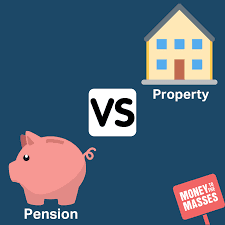Pensions VS Property
PENSIONS VS PROPERTY: SHOULD YOU SAVE FOR RETIREMENT OR INVEST IN PROPERTY?
Whether you want to invest in property or save for retirement, there are plenty of pros and cons for each. If you’re unsure what’s best for you, this guide should help to give you a few handy tips to fit your circumstances.
Property – The Pros
If you find the right property then you could have a fixed income for life. Rental yields can be as high as 8% in some cities, and demand for rental properties is very high, especially in cities.
With demand often outstripping supply, there’s no reason why your property can’t remain permanently occupied if it’s in the right location.
Another advantage of a property vs a pension is that you can cash in at any time.
Of course, a property sale can take many months, and if you need the money by a certain point then you’ll need to plan ahead, but a property can essentially free up a large amount of cash relatively quickly.
Property is also generally considered to be a solid long-term investment. Although the market can fluctuate, house prices tend to go up over the long-term, so unless you’re in a position where you need to sell quickly and potentially make a loss, you can ride out any storms in the housing market to ensure that you sell for a tidy profit if and when you need to cash in.
Property – The Cons
Owning a buy-to-let property isn’t as simple as buying a place, renting it out and watching the money roll in.
Although rental income can be quite lucrative, there are often lots of additional factors to consider, such as maintenance costs, letting agent fees, and landlord insurance, which can all eat away at your profit.
Void periods are another consideration you’ll need to think about, particularly if you’ve got a mortgage on the property, as a few months without tenants can quickly lead to significant extra costs.
Changes in government legislation in recent years have also made owning a second property far less profitable than it once was, with increased taxes affecting profit margins for landlords.
You should also bear in mind that being a landlord can be quite a hands-on role, even if you employ a letting agent or property management company to look after the property. Ultimately, things like repairs and maintenance costs will fall on your shoulders, and a lot of would-be landlords are surprised by the level of responsibility that comes with owning a buy-to-let.
Pensions – The Pros
Compared with property, a pension is usually a far more hands-off way to grow an investment. In many cases it’s as simple as putting money into a pension pot each month and watching it grow, and especially if you have a financial adviser that you can trust to manage your affairs.
After all, there are no tenants or maintenance repairs to think about when you compare it to a buy-to-let property for example.
Another major plus point for pensions is the fact they attract tax relief. So instead of seeing lots of your investment go into the government’s pocket, you’ll actually be benefiting personally, with pensions being the most efficient investments from a tax perspective.
Pensions – The Cons
The main downside to a pension is that you can’t access any of the money until you’re at least 55. However, as it’s an investment for your retirement, this shouldn’t be an issue, and in some ways, this can be a blessing, as it stops you from pulling the money out on a whim.
Another possible downside to a pension is the fact it’s invested in stocks and shares, meaning it could fluctuate. However, as with property, it tends to go up over time, and you have the option to decrease your risk if you wish to.
The Verdict
Ultimately, it comes down to personal circumstances to determine what’s right for you.
When it comes to tax benefits, pensions are the clear winner as they attract tax relief, whereas landlords have been hit with ever-increasing tax bills in recent years.
However, when it comes to growth, property fares better than pensions, with house prices reaching record highs in recently, especially in certain parts of the UK.
As with any investment, there’s risk involved with both options, and while property can be more lucrative if you find the right place, it’s also widely considered to be the more risky of the two options.
If you’re unsure how to invest your capital then it’s always a good idea to consult a financial adviser.
Have questions about investing in property or becoming a landlord?
.



Comments
Post a Comment